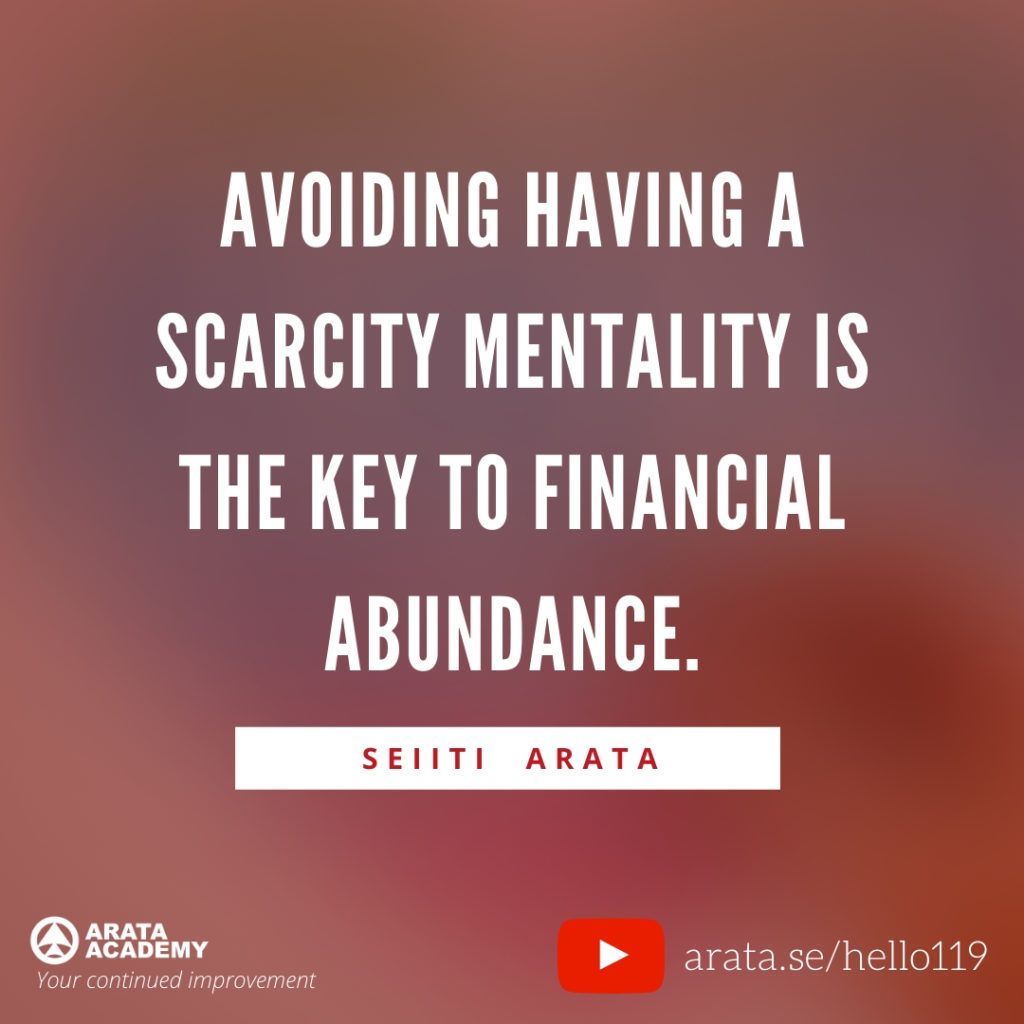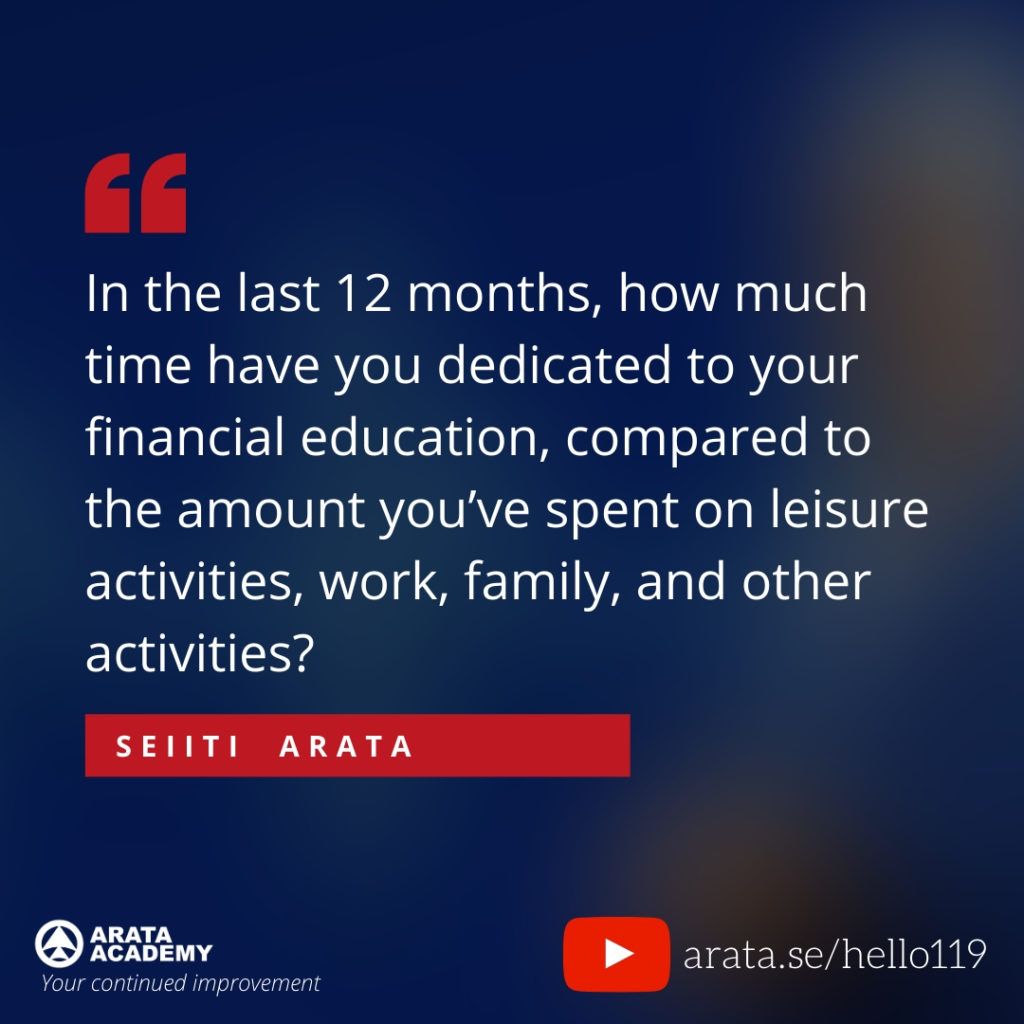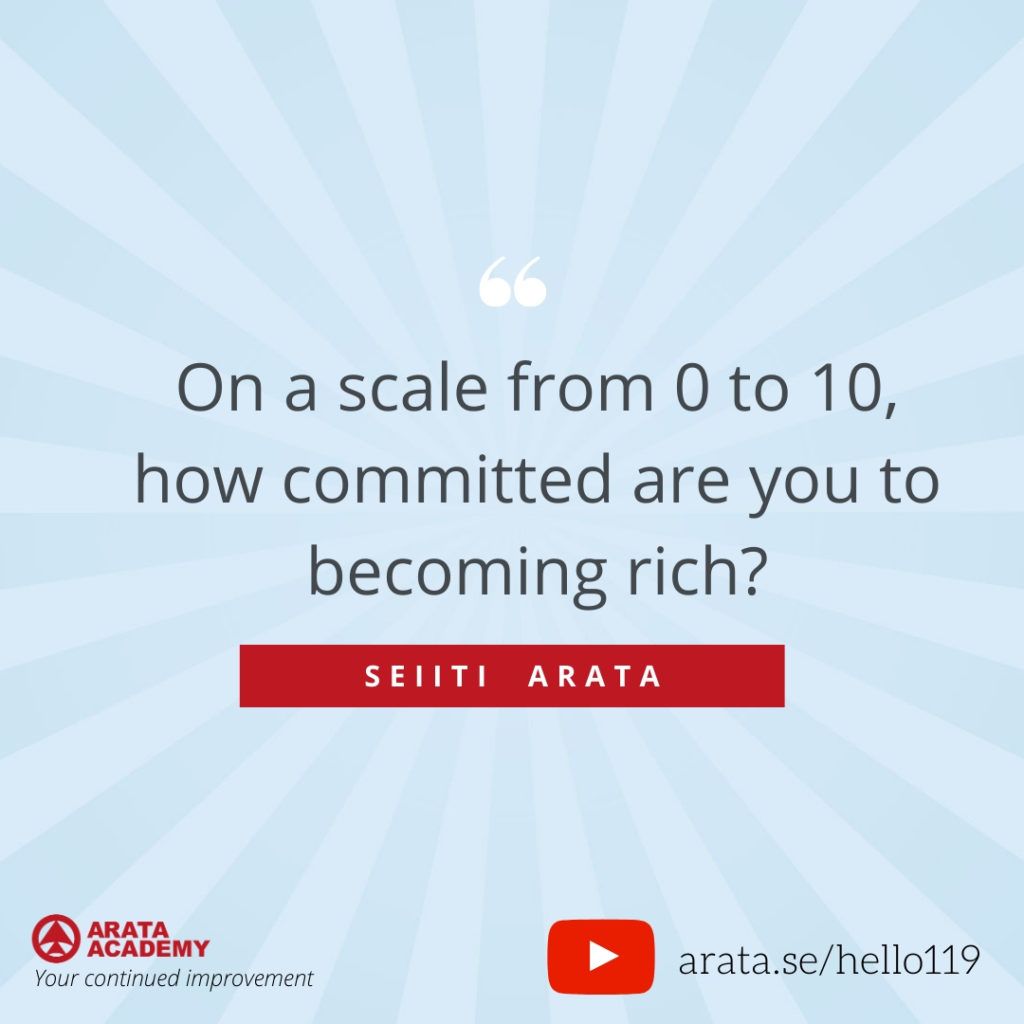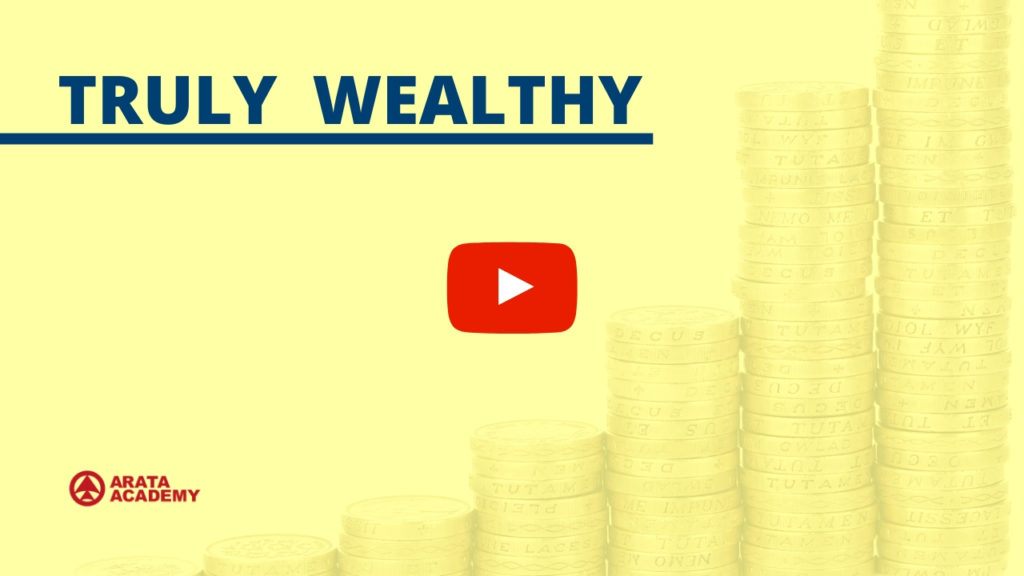Hello! Seiiti Arata. How many people do you know who would like to know how to enrich?
Many, I imagine. Virtually everyone wants to know how to make more money.
Now, how many people do you know who are really committed to achieving this goal?
These are two different groups of people: those who just want … and those who are really engaged. The difference between these two groups shows how we still have a long way to go when it comes to financial education.
Almost everyone says that they want to have more money. But almost no one is willing to really commit to this goal.
In today’s conversation, I would like to propose a course of action that will set you on a path that will help you become a part of a group of people that are really committed to financial enrichment.
You want enrichment, not just more money
Financial enrichment doesn’t just mean having more money. It’s much more than that.
When we are talking about abundance, we are talking about a fairly broad concept. You can have abundance in your health, in money, in relationships, even in your life purpose. In other words, you can live a better life, be a better person.

So that our conversation doesn’t go on for too long, I’ll give you some examples of financial abundance. Of course, you can use the same kind of reasoning for abundance in any other area of your life as well.
When it comes to getting rich, many people think of it this way: If I have an extra 1 million in my bank account, my life will definitely improve.
This is a misconception about abundance. In fact, you should think the opposite. Start trying to see abundance in everything in your life and as a result, you will have more money in your bank account.
Making more money, therefore, is a consequence of seeing life without the mentality of scarcity. If you want to learn how to get rich, you need to understand that having money is just a part of something much bigger: abundance.
As well as learning how to get rich, you need to learn how to multiply your money. You need to learn how to save your money and make it go further. You need to learn to spend in a cost-effective way that’ll fulfill you and bring abundance in all aspects of your life.
In order to achieve this, you need to find some sort of compromise against a negative mind set.
Rich people are committed to being rich
Bear in mind that what we’re going to talk about now doesn’t apply to people in a state of absolute misery or poverty. Our conversation is just between you and me, because we already have a minimum standard of comfort that allows us, for example, to be connected to the internet.

If you have enough resources to watch videos online, but would like to make even more money, even more prosperity, there is a very effective way. However, it’s a path that few people are willing to go follow.
I’m talking about the path of commitment to money. The path that will make you leave the prospect of scarcity and start to see the world with the kind of mentality that will bring you financial abundance.
What is commitment? Commitment is the ability to remain consistent in your actions and sticking to your plan, even if you don’t see any results right away.
For example, what does commitment mean in the context of a romantic relationship? Unfortunately, not all relationships are perfect and the chances are that at some point, all relationships go through rough patches
Your other half might become depressed. It can cause you to feel stuck in the relationship. Or they might get fired, lose their self-confidence, and start behaving in ways that don’t benefit you or the relationship.
Whatever happens, in these times of crisis, if you’re committed to that person, you will continue to stand by them no matter what happens. You will do your best to maintain commitment, even in the face of frustration.
The analogy of a romantic relationship can be used as a way of understanding that our commitment must be equally important in all other areas of our life.
So now is the time for you to act. Reflect on your relationship with money. Even when you’re having a hard time paying bills, even though you still don’t know how to make good investments, and even though your bank balance isn’t looking how you want it to, you should continue to do your best to multiply your money. This is how you will overcome the moments of frustration.
The key to financial abundance is the level of commitment
The second you decide to live with commitment, you immediately live with financial abundance. The money isn’t in your bank account yet, but you’re already fulfilling your goal by being committed.
First, you want to be at peace with your current financial situation. That means having a good relationship with money. Having peace means you don’t have a negative perspective, that you don’t see money as the enemy.

There are people who strongly believe that money is at the root of all problems. There are those who believe that money makes people evil.
When you assign negative characteristics to money, you’re not at peace with your finances. In this situation, it’s normal to lack money, because you’re lacking coherence in your views about it. You say you want money, but at the same time you despise it. You have no commitment to getting richer.
You need to accept your current situation.
Understand the temporal dimension of life. The temporal dimension means that your present situation, your present moment, is a result of your past choices. Your future will be the result of choices you’re making right now, in the present moment.
It’s important to understand this time dimension that your present is a result of your past choices. If you don’t accept this simple truth, you won’t be able to build your future. Those who don’t understand the temporal dimension don’t tend to take responsibility for their own lives.
The more clarity you have that your life today is the result of your past choices, the more motivation you will have to make conscious choices today. Better choices that will shape your future.

That’s what it means to have clarity. This tells us what needs to be done. We need more commitment, we need more responsibility, we need to have a plan of action. We have to fulfill the plan of action.
If you can’t accept reality as it is, you’ll find it difficult to formulate realistic life-improvement plans.
Be wary, though: acceptance isn’t the same as conformism. Acceptance isn’t resignation. It’s just living the present moment with clarity to make better, reality-based decisions. So, in addition to accepting the truth, you need to be realistic.
Stop making excuses. Face the truth as it is.
Examine the last 365 days of your life. In the last 12 months, how many hours have you spent studying different types of investment?
How many different applications have you tried to manage your accounts? How many spreadsheets did you create to make simulations about what will happen to your money in the future? What were your initiatives in employment to become a more valuable professional, and therefore receive a higher salary? How many resumes have you sent to look for a better job?
How many hours have you spent reading books, doing training courses, acquiring skills to become a better professional? With how many mentors did you connect, being humble enough to ask for guidance? How many of your favourite TV series have you consciously decided to stop watching so that you’d have more free time to devote to your personal growth?
In short, what is the grade you give to your commitment?
Give yourself an honest score, between zero and 10, about how much your commitment to money has been in the last year.
What has been your real commitment to managing your money? What are you willing to do to earn more? What has been the commitment for you to invest better?
Write down the score you gave yourself. What was the score you gave to your commitment to your money?
Now I’m going to ask a question for most of the people here. If you didn’t give yourself a score of 10 out of 10, why not? What are the valuable actions that you’re not doing? What are the destructive actions you have to stop?
Imagine that you’re going to have heart surgery. Imagine that the surgeon in charge tells you that, on a scale of zero to 10, he’ll give himself a 7 out of 10 in terms of commitment to the procedure.
He’s giving himself a 7 because instead of focusing solely on the surgical procedure, he’ll have to take calls, check out social networks, and be away from the operating room to smoke a cigarette or have a snack break.
How would you feel as a patient? Would you trust your future in the hands of this doctor who only gave himself a 7 out of 10?
So why would you trust your financial future to someone with the same score?
Remember the question I asked at the beginning of the conversation? Are you one of the people who say you want to know how to get rich, but you really don’t have a real commitment to that goal?
If you gave yourself any score below 10, I want to invite you to pick up a notebook to answer the following questions:
For the next 30 days, what will you do specifically to increase your level of commitment to your money? In the next 30 days, which actions will be implemented and finalised? What will you do to change your behaviour? How will you make different choices to have different results?
Taking the time to answer these questions means increasing your commitment to money, your commitment to your own financial future.
If you want to continue to improve this commitment, visit the arata.se/moneytaboo to watch a special class where I show you how to overcome various money-related taboos.

